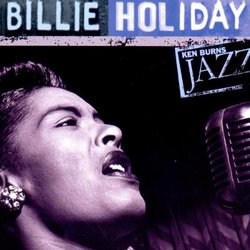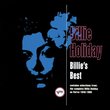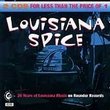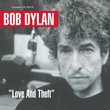| All Artists: Billie Holiday Title: Ken Burns JAZZ Collection: Billie Holiday Members Wishing: 0 Total Copies: 1 Label: Polygram Records Original Release Date: 11/7/2000 Release Date: 11/7/2000 Genres: Jazz, Pop, Broadway & Vocalists Styles: Swing Jazz, Traditional Jazz & Ragtime, Vocal Jazz, Oldies, Vocal Pop, Cabaret, Traditional Vocal Pop Number of Discs: 1 SwapaCD Credits: 1 UPC: 731454908122 |
Search - Billie Holiday :: Ken Burns JAZZ Collection: Billie Holiday
 | Billie Holiday Ken Burns JAZZ Collection: Billie Holiday Genres: Jazz, Pop, Broadway & Vocalists
This greatest-hits collection accompanies Ken Burns's 10-part documentary Jazz and shows that though she never practiced the vocal gymnastics of an Ella Fitzgerald, Billie Holiday was unquestionably among the greatest jazz... more » ![header=[] body=[This CD is available to be requested as disc only.]](/images/attributes/disc.png?v=a4e11020) ![header=[] body=[This CD is unavailable to be requested with the disc and back insert at this time.]](/images/attributes/greyed_disc_back.png?v=a4e11020) ![header=[] body=[This CD is unavailable to be requested with the disc and front insert at this time.]](/images/attributes/greyed_disc_front.png?v=a4e11020) ![header=[] body=[This CD is unavailable to be requested with the disc, front and back inserts at this time.]](/images/attributes/greyed_disc_front_back.png?v=a4e11020) |
Larger Image |
CD DetailsSynopsis
Amazon.com This greatest-hits collection accompanies Ken Burns's 10-part documentary Jazz and shows that though she never practiced the vocal gymnastics of an Ella Fitzgerald, Billie Holiday was unquestionably among the greatest jazz singers, with a subtle inventiveness in phrasing and note choice and a tremendous capacity to swing. This collection covers virtually the entire career of a fascinating and troubled artist, beginning with her sparkling mid-1930s recordings with pianist Teddy Wilson and the cream of swing-era horn players. While those fresh-voiced early records already indicate Holiday's capacity for conveying the nuances of a lyric, her work soon took on greater drama. "Strange Fruit," a 1939 account of a lynching, marked a breakthrough in the popular song, as well as in Holiday's career, and her controlled intensity only becomes more marked on signature songs like the wistful "God Bless the Child" and the moving "Don't Explain." Holiday's voice deteriorated in the later 1950s, but performances like "Fine and Mellow" show that her emotional power and musicality remained intact. --Stuart Broomer Similarly Requested CDs
|
CD ReviewsIf you only want one Lady Day CD, this may be the one! J. Lund | SoCal, USA | 11/11/2000 (5 out of 5 stars) "Billie Holiday's tumultuous personal life may have led to her death at age 44, yet 'Lady Day' was a consistently productive recording artist over the course of an approximately quarter-century-long career that ended just before she passed in 1959.Most historians would agree that Billie's career neatly divides into three phases. Her first decade in the limelight was divided between sessions for labels presently available through Sony and Commodore. Though the quality of the tunes she recorded varied widely, these small-group sessions featured Billie with some of the greatest jazz musicians of the era (Lester Young, etc). She spent the last half of the 1940s recording more commercial sessions for Decca (often marked by dated, syrupy pop orchestration). The quality of the accompiament may have left a lot to be desired, but Billie's vocals usually transcended her surroundings. Her last decade found Lady Day mostly back in all-star combo settings for Verve, or with orchestral accompiament for her last two albums (e.g., LADY IN SATIN). Fans continue to argue about whether Billie's voice in her final years became a shadow of its former self, or if she compensated for any loss in technique with more emotively-satisfying performances. My opinion is: sometimes the former, often the latter. What is admirable about this collection is that it provides enough examples of each era to give the listener a starting point to explore your preferred periods in more depth later, or to have this CD be a decent representation of her career for those on a tighter budget. Given just one CD's worth of time to fill, the compilers of this CD seem to have done as good a job as possible of hitting the high notes of Billie's remarkable career." Billie Holiday Ken Burns Jazz Charles J. Haugnhey | Kensington, MD United States | 02/20/2001 (4 out of 5 stars) "I'm generally quite pleased with the CD, and feel it nicely covered the three periods in Billie's artistic life. It is a fine CD for a listener just beginning to experience Billie's astonishing music. Billie clearly portrays multiple and often conflicting emotions and blends them with her overpowering musical instinct.Billie was surrounded by a perpetual hall-of-fame of jazz instrumentalists such as Benny Goodman, Lester Young and many others. You'll hear these superstars on this and other Holiday CDs on both accompanyment and solo.There is a sound quality problem with loud hiss on the first two tracks. I own the referenced Columbia CDs that contain the original remastering of these two songs, "I Cried for You" and "What a Little Moonlight Can Do." The hiss is greatly reduced on these earlier CDs, but the upper frequencies of the music are somewhat surpressed as well. I prefer to listen to these songs on the earlier recordings.The CD cover and jewel box liner contains the phrase "Ken Burns Jazz." Some might view this cover as implying that the album has at least Mr. Burns's imprimatur, if not his possession. To my ears, this CD contains a personal artistic statement of Billie Holiday and her accompanying artists. Secondarily, but most importantly, this music is possessed in the minds and hearts of all her listeners, past, present, and future. Thank Ken Burns for his documentary, but have a listen to Billie for yourselves." Excellent All Across-the-Board Sampler Peter | East of Los Angeles | 02/02/2001 (5 out of 5 stars) "Kudos for compiling a CD that captures Billie at all phases of her career. This set gives an insight into how Billie evolved as a singer over time. It's like reading a book of her life. It's also a first that it manages to pick songs from all the different record labels she recorded on. Theres a plethora of moods and tempos established by the songs here, depending which phase of Billie's career you are listening. Many will like (and be surprised by) the fast tempo of the swing tunes, such as "I Cried For You" and "What A Little Moonlight Can Do". For those who are not familiar with Billie's stuff from the '30s, it's amazing to hear her sing with so much joy and life. Over time Billie's singing grew increasingly languid and the pace slower, and this CD illustrates that change, but that doesn't diminish her growth as an artist. Most of the song choices are indelibly linked to Lady Day. It wasn't until the last few years of her life that her voice truly faltered. Still you cannot but be amazed by the soulfulness that Billie invests each song. Whatever technical shortcomings she developed by the ravages of her well-known drug abuse, she compensates that with her unique interpretive ability and emotional commitment to each song. None is more dramatically highlighted than "You've Changed" (recorded a year before she died). Here she still manages to blow you away by its emotional wallop. I am still floored everytime I hear this piece. The strings and arrangements of Ray Ellis only accentuates the tragic circumstances of this song. I often wonder what kind of artist Billie would become had she not gotten involved with drugs and booze, but that's a moot point. She has left us a rich aural treasure. Lay in peace, Lady."
|

 Track Listings (19) - Disc #1
Track Listings (19) - Disc #1








